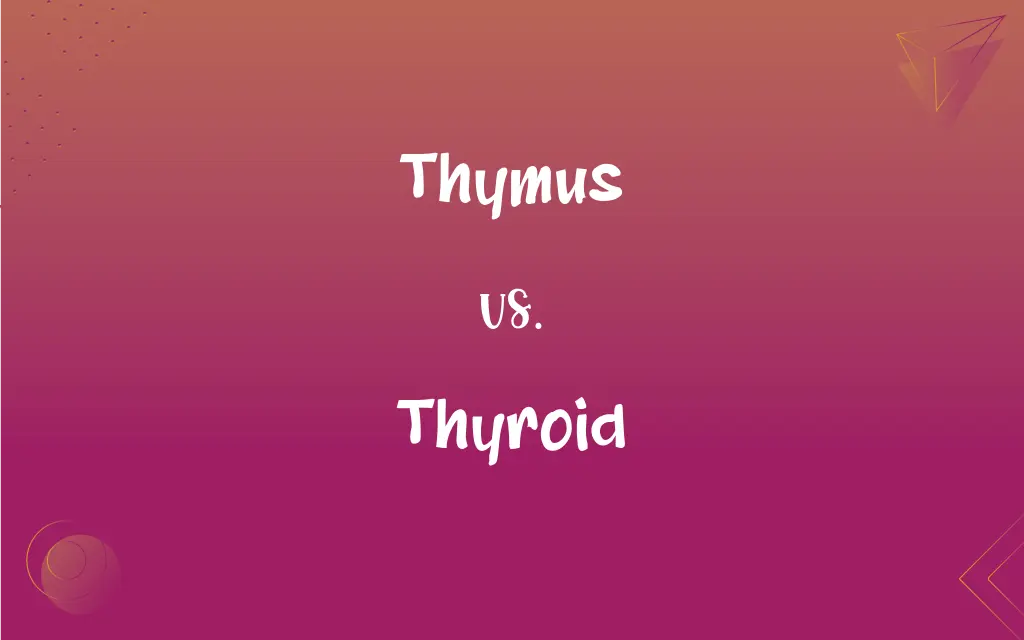Thymus vs. Thyroid: What's the Difference?
Edited by Janet White || By Harlon Moss || Updated on October 18, 2023
The thymus is a lymphoid organ involved in immune system development, while the thyroid is a gland that produces hormones regulating metabolism.

Key Differences
The thymus and thyroid are distinct organs in the human body, each serving unique and critical functions. The thymus, situated behind the sternum and between the lungs, is primarily involved in the immune system. It is most active during childhood and adolescence, aiding in the maturation of T cells, which are essential for adaptive immunity. The thyroid, on the other hand, is a butterfly-shaped gland located at the front of the neck, just below the Adam's apple.
The thyroid plays a significant role in regulating the body's metabolism. It produces two primary hormones, thyroxine (T4) and triiodothyronine (T3), which influence almost every cell in the body. In contrast, the thymus does not produce hormones; its primary role revolves around the immune system. A malfunctioning thyroid can lead to conditions like hyperthyroidism or hypothyroidism, which can significantly affect a person's energy levels and overall health.
While the thymus decreases in size and functionality as a person ages, often replaced by fatty tissue in adulthood, the thyroid typically maintains its function throughout life. The thymus' regression does not mean it becomes irrelevant; it has already seeded the body with T cells by adulthood. Meanwhile, the thyroid's consistent functionality underscores its vital role in maintaining metabolic stability.
In summary, while both the thymus and thyroid are integral to human health, they serve very different roles. The thymus is pivotal for the development and maturation of the immune system, especially in early life, while the thyroid is crucial for regulating metabolism throughout life.
Comparison Chart
Location
Behind the sternum, between the lungs
Front of the neck, below the Adam's apple
ADVERTISEMENT
Primary Function
Immune system development
Production of hormones regulating metabolism
Hormone Production
Does not produce hormones
Produces thyroxine (T4) and triiodothyronine (T3)
Relevance in Adulthood
Reduces in size and functionality
Maintains consistent functionality
Diseases/Conditions
DiGeorge syndrome, thymomas
Hyperthyroidism, hypothyroidism, goiter
Thymus and Thyroid Definitions
Thymus
A lymphoid organ involved in immune system development.
The thymus is essential for T cell maturation.
ADVERTISEMENT
Thyroid
Located at the front of the neck.
A swollen thyroid can be indicative of a goiter.
Thymus
Active primarily during childhood and adolescence.
The thymus is larger in children than in adults.
Thyroid
Produces thyroxine (T4) and triiodothyronine (T3) hormones.
These pills supplement the hormones not produced by the thyroid.
Thymus
Located between the lungs and behind the sternum.
The surgeon removed a tumor from the thymus.
Thyroid
A gland producing hormones that regulate metabolism.
The doctor diagnosed her with an underactive thyroid.
Thymus
Diminishes in size and function with age.
By adulthood, the thymus has often been replaced by fatty tissue.
Thyroid
Its dysfunction can lead to energy level changes and other health issues.
Hyperthyroidism is a condition where the thyroid is overactive.
Thymus
A site of T cell maturation and differentiation.
Without a functioning thymus, adaptive immunity is compromised.
Thyroid
Influences nearly every cell in the body.
Thyroid hormones play a role in regulating heart rate and body temperature.
Thymus
A small glandular organ that is situated behind the top of the breastbone, consisting mainly of lymphatic tissue and serving as the site of T cell differentiation. The thymus increases gradually in size and activity until puberty, after which it begins to atrophy.
Thyroid
The thyroid gland.
Thymus
A similar structure in other vertebrate animals.
Thyroid
The thyroid cartilage.
FAQs
Where is the thymus located?
The thymus is located behind the sternum and between the lungs.
Is the thymus active throughout life?
No, the thymus is most active during childhood and adolescence and reduces in size and function with age.
What is hyperthyroidism?
Hyperthyroidism is a condition where the thyroid produces excessive amounts of hormones.
What hormones does the thyroid produce?
The thyroid produces thyroxine (T4) and triiodothyronine (T3).
Can thyroid issues affect energy levels?
Yes, thyroid dysfunction can significantly impact energy levels and overall metabolism.
Can children have thyroid issues?
Yes, children can experience thyroid dysfunction, though some symptoms might differ from adults.
How is hypothyroidism different from hyperthyroidism?
Hypothyroidism is an underproduction of thyroid hormones, while hyperthyroidism is an overproduction.
Is the thymus related to the tonsils?
No, the thymus and tonsils are separate organs with different functions.
Are thyroid issues hereditary?
Some thyroid conditions have a genetic component, but environmental factors also play a role.
Why is the thymus important?
The thymus is vital for the development and maturation of T cells, essential for adaptive immunity.
How can one check thyroid functionality?
Blood tests measuring T3, T4, and TSH levels are common methods to assess thyroid function.
Is the thymus susceptible to tumors?
Yes, tumors called thymomas can develop in the thymus.
Do both the thymus and thyroid produce hormones?
Only the thyroid produces hormones; the thymus is involved in immune system development.
How does the thyroid affect metabolism?
Thyroid hormones regulate metabolic rate, influencing energy consumption and body temperature.
What are the primary roles of T4 and T3 hormones?
T4 and T3 hormones regulate the body's metabolism, affecting various physiological processes.
Are there surgical treatments related to the thyroid?
Yes, procedures like thyroidectomy remove part or all of the thyroid gland for certain conditions.
Can thymus issues impact immunity?
Yes, thymus abnormalities can affect the maturation of T cells, compromising adaptive immunity.
What's a goiter?
A goiter is an abnormal enlargement of the thyroid gland.
Is the thymus involved in any autoimmune conditions?
Yes, conditions like myasthenia gravis have links to the thymus.
What happens to the thymus in adulthood?
The thymus diminishes in size and functionality, often replaced by fatty tissue.
About Author
Written by
Harlon MossHarlon is a seasoned quality moderator and accomplished content writer for Difference Wiki. An alumnus of the prestigious University of California, he earned his degree in Computer Science. Leveraging his academic background, Harlon brings a meticulous and informed perspective to his work, ensuring content accuracy and excellence.
Edited by
Janet WhiteJanet White has been an esteemed writer and blogger for Difference Wiki. Holding a Master's degree in Science and Medical Journalism from the prestigious Boston University, she has consistently demonstrated her expertise and passion for her field. When she's not immersed in her work, Janet relishes her time exercising, delving into a good book, and cherishing moments with friends and family.
































































